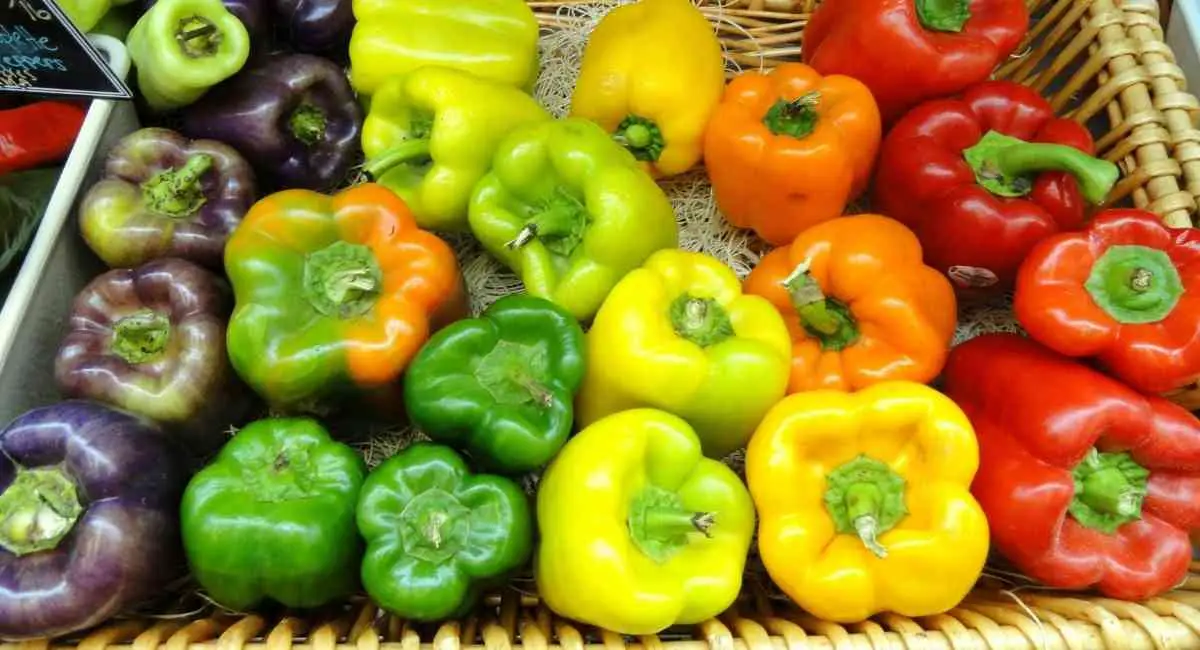These days more and more dog owners are choosing to feed their pets a more healthy, well-balanced diet. This includes them choosing to make food for their pup themselves in some cases.
As they have discovered, making homemade food for their dogs provides them with several health benefits. Plus, anyone who has a dog with digestive issues finds they can make meals that include ingredients that will help to reduce problems caused by an upset stomach.
We eat all kinds of foods that you can also feed your dog. But one question often asked is: are bell peppers bad for dogs?
In this article, we will answer this question and look at the benefits of, say, green peppers in your dog’s diet.
Can Dogs Eat Bell Peppers?
Yes, it is okay for you to include some of these nutritious foods in your dog’s diet. They are safe and your pooch will not suffer from any health or stomach issues. However, you need to make sure that you feed them the correct amounts.
Along with including some bite-sized pieces of these peppers into their diet, you can have other healthy vegetables and fruits in it as well.
It is, however, recommended that you limit how many of these varieties of peppers you include in your dog’s food.
Please note that these colorful peppers have a high fiber content, which can prove dangerous to your dog’s health, especially if they consume them in large quantities.

What are the Benefits of Including These Peppers in Your Dog’s Diet?
Including a moderate amount of bite-sized pieces of fresh vegetables in your pet’s diet will prove beneficial to their health.
Like other vegetables, these are a good source of nutrients, vitamins, and minerals for your dog to stay healthy.
In a 100 gram serving of green bell peppers it contains the following:
- Six grams of carbohydrates
- Less than 1/2 gram of fat
- One gram of protein
- Roughly 30 calories
Also, these common peppers contain essential vitamins, such as Vitamin A, Vitamin B6, Vitamin E, Vitamin C, and Vitamin K. Along with folate and potassium that are beneficial to your pet’s health relating to kidney function, cardiovascular health, thyroid, and cognitive function.
But just how are these essential nutrients beneficial to your dog’s health.
Here’s what you should know:
- Raw and cooked pieces of bell peppers are a good source of Vitamin A. This helps to maintain your dog’s eye health
- A good source of Vitamin C. It will help to provide support to your dog’s immunity system
- The amounts of Vitamin E in bite-sized pieces of this vegetable will help to keep their skin and coat healthy.
- As for Vitamin B6, this aids the maintenance of a healthy immune system.
- Potassium is a nutrient that is good for maintaining healthy bones.
So as you can see above, due to their abundance of nutrients, they are a very beneficial healthy snack for your pet.
Of the different colours of peppers, which is the most nutritious?
Which Color of Bell Peppers Offers the Most Nutritional Benefits?
You can feed your dog red, green, or yellow bell peppers as long as you limit how much you feed them.
Of the three different colors, the one that offers the most significant health benefits to your dog is the red one. This is the pepper with the highest nutrient content.
Red bell pepper contains a high concentration of Vitamin A, Vitamin C, and beta-carotene. Also, it is worth considering feeding your dog bite-sized treats of this vegetable when it is at its ripest, as the nutrient content is even higher.
How Much of These Should You Feed Your Dog?
It is crucial to remember that your dog is mainly a carnivore, so they don’t need too many vegetables in their diet. The inclusion of too much human food in their diet could lead to an upset stomach, diarrhea, and, in some situations, vomiting.
If you want to include green peppers, yellow peppers, or red peppers in your dog’s regular food, begin by adding a small slice. It is best if you cut it up into bite-size pieces. Then gradually, over time, you can start to include more in their pet food to prevent any kind of digestive issues from arising.
As well as cutting them up into bite-sized pieces, why not steam them first? Then you can place them in a food processor along with other small amounts of vegetables to make a broth to include in your pet’s food. In addition, you can add foods such as raw carrots, raw broccoli florets, and cauliflower into bite-sized pieces in their meals.
How much you give to your dog depends on their size and the type of diet they are enjoying now.
For a small dog, you should only be giving them between 1-3 medium slices once or twice a week to reap the benefits of peppers like these. As for larger dogs, it is okay to let them have around half of any color of these peppers a couple of times each week.
However, if you intend to give these pepper varieties as a tasty snack or pet treats, never give them more than half a slice. Any pet treats you give to your dog should only make up around 10% of their daily diet. Any more than this could lead to health issues and adverse side effects.

Is Feeding Them This Colorful and Nutrient-Rich Vegetable Raw a Good Idea?
Yes, if you want, you can feed your dog raw peppers as they provide a satisfying crunch. You will need to be careful, though, as they can sometimes cause your dog’s digestive system problems. For example, some dogs may have problems digesting food with high fiber content.
If you want to include such a colorful veggie in your dog’s natural diet, it is best to give them cooked peppers rather than raw ones. Also, make sure that you remove the stem and seeds before including any color bell pepper in your dog’s natural diet as bite-sized pieces.
Above, we have shown that it is okay to feed your dog bell peppers. Remember to do so in moderation, and it is best to cook them first before you do.
So again, in answer to the question, are bell peppers bad for dogs?, the answer would be no.
We would love to know what you think of this article.
How has your dog reacted when you’ve included such awesome veggies into their daily diet?
